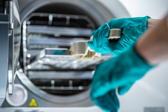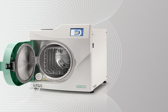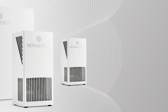Categories
Most Recent
What does it mean to be ‘compliant’ in dentistry?
6th Oct 2023 in DentalDentistry is a high-risk profession and so compliance with all regulations is imperative. Being compliant means you take the steps to ensure patients are treated and cared for effectively and efficiently. It also means that the risks of infection transmission are kept to a minimum and strict processes within the dental practice are being diligently upheld.
The art of record-keeping – what you need to know
Meticulous record-keeping is vital to demonstrate that you are carrying out processes correctly. In particular, your decontamination equipment is your first line of defence against the spread of infection – all instruments must be decontaminated as set out in the HTM01-05 and SDECP guidelines. As you know, to ensure that your decontamination equipment is compliant and is working correctly, records of cycle parameters and routine testing and maintenance should also be made and kept for a minimum of two years. Regarding your steriliser, records must be made for every sterilisation cycle, too. This contributes to the cycle traceability, which refers to the ability to ensure that the decontamination has been carried out appropriately and, if needed, can be referred back to by the user or any relevant bodies. Essentially, by remaining compliant, you have the peace of mind that you are carrying out processes adequately, thus reducing the risk of infection transmission. By keeping a record of the decontamination processes and the performance of your equipment, you can also clearly ascertain whether your equipment is working at its optimum.
Audits are essential and show that you have valid quality processes in place. They can flag up any areas that are non-compliant, which you can then implement into an action plan. If something is flagged up, such as a particular step in the decontamination process, then there is a serious risk of other steps in the process becoming compromised. For example, if your washer disinfector has not properly processed the load, then this threatens the sterilisation process in the autoclave – items will have to be completely reprocessed. As such, collecting the correct information ensures you have a complete image of the entire instrument decontamination process, including any potential threats in your routine.
Further still, it is essential that all relevant members of the dental team are appropriately trained, and certificates kept, to perform the necessary infection control processes safely and effectively. They should also be sufficiently trained to maintain the equipment and ensure that all appropriate audits are completed correctly. The team’s knowledge needs to be regularly refreshed and updated on the topic, ensuring that they are aware of the latest guidance and they comply with the GDC’s ECPD cycle requirements. Evidence of the team’s training must also be recorded and be made accessible as part of any CQC/audit inspections to demonstrate compliance.
Can record-keeping be simplified?
Record-keeping can be a time-consuming task, but it is a vital part of practising safe and ethical dentistry – there are absolutely no exceptions. However, you can optimise record-keeping without compromising on the quality of the information you record. Firstly, making sure that all members of the dental team who are involved in record-keeping are appropriately trained about their roles is crucial. This will remove any uncertainty and ensure that all record-keeping is being carried out meticulously – it really is a team effort.
Secondly, decontamination solutions from leading manufacturers are equipped with advanced features that help to enhance the decontamination process. For instance, certain systems will have the ability to control and verify each cycle, in addition to automated cycle data recorders. To ensure that the piece of equipment is performing as it should, some models will also inform you when the door seal and air filter need replacing. As such, you can rest assured that the load is being processed under the correct conditions. Many processes within the dental practice have benefited from going digital, and record-keeping for your decontamination equipment is one more example. Such an important aspect of practising safe dentistry can be made all the more straightforward.
The Little Sister range of autoclaves from Eschmann boasts of several features that enhance and streamline your record-keeping process. These include a USB cycle data recorder and optional connection to the wireless AutoLog cycle data manager and e-logbook, digitising and automating the entire process for minimal risk of human error. You can also protect your equipment with Eschmann Care & Cover, which provides everything you need to ensure your equipment remains compliant, including testing, validation and Pressure Vessel Certification. For further added value, the Eschmann Care & Cover includes Certified User training for all equipment and is ECPD accredited.
A culture of safety and compliance
Record-keeping is a necessary part of dentistry, but it does not have to be a stressful endeavour. With modern systems designed to enhance and optimise record-keeping and traceability, you can remain compliant and demonstrate your commitment to providing safe dentistry to patients.









